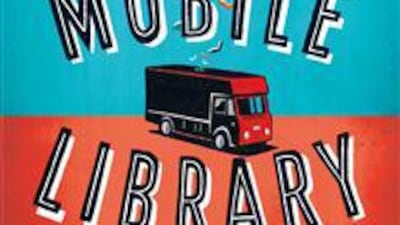Mobile Library opens with a depiction of an adventure that seems to be drawing to a close. On a clifftop on the coast of the south of England, Bobby, Val and Rosa are nestled in the cab of the vehicle – the lending library on wheels – that has enabled each of them to journey from their former lives, provided each with a glimpse of a future that is "beautiful and full of love". Beyond them lies only the sea and sky; behind, "a crescent of police cars" pins them to the cliff edge.
Beginning a novel with a taste of what will become its denouement can be an effective way of structuring a narrative. It invites us to ask what has happened, what will happen. And it can invite the suspicion that we are about to encounter a work that pursues a diverting plot at the expense of the other things that fiction ought to do. Such is the case with Mobile Library, a kind of fairy tale, and David Whitehouse's follow-up to his debut novel, Bed.
As we leave behind the novel’s inaugural scene, the narrative skips backwards to introduce us to the loveless world of 12-year-old Bobby Nusku. Bobby – “slight, waspish and the colour of milk” – lives in fear of his violent father. He spends his days by collecting tributes to the mother he feels sure will one day return, by plotting ways to exact revenge on those who have hurt him and his friends, and by searching for a means to leave a town that “existed, as did its people, in a moment it wanted to escape”.
For Bobby, the promise of escape comes initially in the form of friendship, one of the book’s main themes. First there is Sunny Clay, his indefatigable protector, and for a time his “best and only friend”. Next comes Rosa Reed, disabled, clumsy and a year his senior. And then there is Val, Rosa’s mother, who offers both a figurative and a literal form of escape by introducing Bobby to the town’s mobile library: the vehicle in which his love of books is engendered, and in which the three (Val, Rosa, Bobby) will soon secretly have to leave town.
As they travel all over the country, they find solace and excitement in a world of books and stories, and in the real adventure that they are writing for themselves. Whitehouse chronicles the group’s journey, and the affective bonds that develop between them, with pace. The fairy-tale world he creates is atmospherically charged, and he writes with tenderness about the struggles with loneliness, fear and family that are the stories of our lives.
One of the things he wants us to consider is that those stories are just stories, are social narratives that can be rewritten by us. As he says in one of the book’s two metafictional chapters: “Family is where it’s found. Family doesn’t have to be a father, a mother, a son or a daughter. Family is where there is love enough.” Which seems like, and in some ways is, a sane and humane message. But it is also a chimerical and contestable one that would function more convincingly in the book if it were offset against some sustained modulation, irony or counter-position.
This tendency to diminish resonance through overstatement is characteristic of Whitehouse’s prose. When he says of the detective in pursuit of Bobby et al that “It had been a long, frustrating night chasing shadows that refused to be boxed”, the frustration we feel comes not from the event being described but from the final part of the sentence itself. Elsewhere, the bewilderingly vague (“Houses are bodies, their memories mapped by the scars left behind”) competes with the outright cringe-making: “What the past few months had taught her [Val], was that it wasn’t the swimming, but who you clung to on the way that was important.” There is a point at which mawkishness descends into complete mawk.
This is a shame. Whitehouse’s broad message – that books can be transporting and transformative, can induce empathy and help us confront life’s great excruciations – is an appealing one, and there is truth to it. But much of the novel – the carelessness of the prose, the refusal to develop themes by writing around them and against them – feels too perfunctory, too cosy, to carry that case. There is room for comfort in fiction. But, if it is to fulfil the role Whitehouse claims for it, it ought to be challenging too.
The book is available on Amazon.
Matthew Adams is a London-based reviewer who writes for the TLS, the Spectator and the Literary Review.

